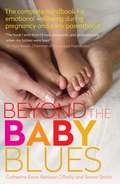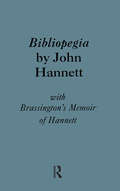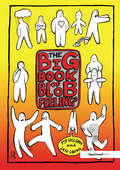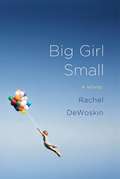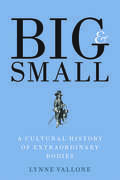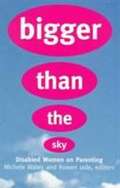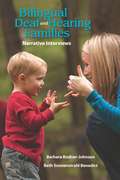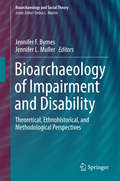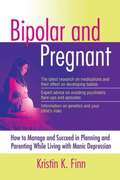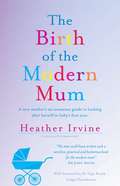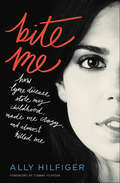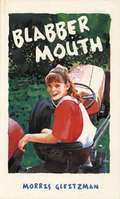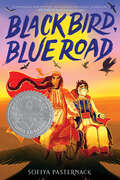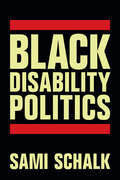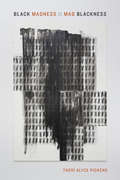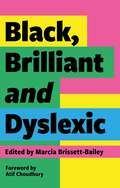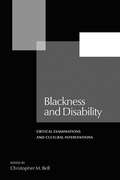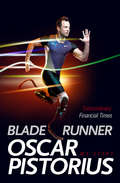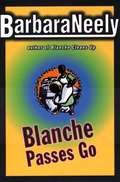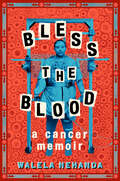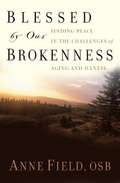- Table View
- List View
Beyond the Americans with Disabilities Act: Inclusive Policy and Practice for Higher Education
by Mary Lee Vance Neal E. Lipsitz Kaela ParksA primer and quick reference book, it is for higher education professionals including administrators, faculty, and staff, who work with students with disabilities, both apparent and hidden. The book is divided into four parts. Part I addresses the ADA and changing perspectives on disability. Part II covers information and communication technology. Part III addresses emerging and growing populations and their impact on higher education. Part IV provides examples of best practices in student affairs and disability services.
Beyond the Baby Blues 2nd Edition
by Seana Smith C Knox Benison O'ReillyBeyond the Baby Blues is a comprehensive Australian resource guide to perinatal depression and anxiety (PND). Readers will receive solid scientific advice combined with the experiences of individuals and families affected and the professionals who treat them. The book includes the scientific explanation for PND an exploration of perinatal screening and the ideals and the realities of early parenthood. There is still a heavy stigma attached to perinatal depression in Australia compared to the rest of world. The authors want to increase understanding and open the conversation about depression during and after pregnancy so that parents do not suffer alone. Caring professionals, family members and friends explain how they helped sufferers of depression, as well as how their caretaker involvement affected their own lives. Included are self-care strategies aimed to help parents take care of themselves and their families throughout the difficult first year of parenthood. Beyond the Baby Blues is supportive and encouraging, deeply personal yet backed up with science and medical expertise.
Bibliopegia: Or, The Art Of Bookbinding In All Its Branches; Illustrated With Engravings (Cambridge Library Collection - History Of Printing, Publishing And Libraries Ser.)
by John Hannett W. S. BrassingtonA part of the history of bookbinding collection-A series of reprint volumes, original monographs, and translations relating to the history of bookbinding. This volume includes a Bibliopegia of bookbinding in two parts- The ‘Books of the Ancients and History of the Art of Bookbinding’. and in part two, ‘The practical art of bookbinding’. This edition includes Brassington’s memoir of Hammett.
Big Book of Blob Feelings (Blobs)
by Pip Wilson Ian LongThe Big Book of Blob Feelings uses questions linked to specially selected, photocopiable pictures to help you explore feelings with those who struggle to communicate about their emotions. Tried, tested and loved internationally, this inspirational resource includes a wealth of material around: Blob Theory - the feelosophy, our open-question approach and the importance of allowing people to express their choices freely; Emotions - every day we all experience a wide range of feelings, a broad selection of which have been illustrated to kick-start discussions; Developmental issues - the objective of each of the sheets is to see people of all ages grow in their awareness of who they are, their uniqueness, and how they can develop those gifts further as they share with others. Each picture is accompanied by ideas and questions to kick-start class, group or one-to-one discussion so that everything in the book is relevant to your needs in your setting. The complete book is also included electronically on the accompanying downloadable resources so that you can print and re-use resources as often as you need to. The perfect companion to this book is The Big Book of Blob Feelings 2, which provides a huge range of new material while following the same structure and approach.
Big Girl Small: A Novel
by Rachel DewoskinThe acclaimed author of "Repeat After Me" presents a scathingly funny and moving novel about a 16-year-old girl who becomes caught in a controversy that might bring down her whole school--a scandal that has something to do with the fact Judy is three feet nine inches tall.
Big and Small: A Cultural History of Extraordinary Bodies
by Lynne ValloneA groundbreaking work that explores human size as a distinctive cultural marker in Western thought Author, scholar, and editor Lynne Vallone has an international reputation in the field of child studies. In this analytical tour-de-force, she explores bodily size difference—particularly unusual bodies, big and small—as an overlooked yet crucial marker that informs human identity and culture. Exploring miniaturism, giganticism, obesity, and the lived experiences of actual big and small people, Vallone boldly addresses the uncomfortable implications of using physical measures to judge normalcy, goodness, gender identity, and beauty. This wide-ranging work surveys the lives and contexts of both real and imagined persons with extraordinary bodies from the seventeenth century to the present day through close examinations of art, literature, folklore, and cultural practices, as well as scientific and pseudo-scientific discourses. Generously illustrated and written in a lively and accessible style, Vallone’s provocative study encourages readers to look with care at extraordinary bodies and the cultures that created, depicted, loved, and dominated them.
Bigger than the Sky: Disabled Women on Parenting
by Michele Wates Rowen JadeIn this anthology the editors gather work by a variety of women with disabilities, united by the theme of parenting. Many contributors write enthusiastically about their parenting experiences; some explain their choice not to raise children; some write about meaningful relationships with children outside the traditional parent role. The authors represent disabilities including blindness, deafness, MS, post-polio, cerebral palsy, and cognitive and psychiatric disabilities.
Bilingual Deaf and Hearing Families: Narrative Interviews
by Barbara Bodner-Johnson Beth Sonnenstrahl BenedictThis study emphasizes the importance of family support for deaf members, particularly through the use of both American Sign Language (ASL) and spoken and/or written English. Research has shown how these factors influence such areas as a child's development, performance in school, and relationships with brothers and sisters. In this volume, authors Barbara Bodner-Johnson and Beth S. Benedict concentrate on the vital, positive effects of bilingualism and how families that share their experiences with other families can enhance all of their children's achievement and enrichment. Bilingual Deaf and Hearing Families: Narrative Interviews describes the experiences of ten families who have at least one deaf family member. In five of the families, the parents are hearing and they have a deaf child; two of the children in these families have cochlear implants. In three families, both the parents and children are deaf. In one family, the parents are deaf and their daughter is hearing; and in one family, the parents and one child are deaf and they all have cochlear implants, and the deaf child's twin is hearing. The interviews were conducted in the families' homes using set topics and questions. The family discussions cover a wide range of subjects: cochlear implants, where they live, their thoughts about family relationships, how they participate in the Deaf community, how they arrive at certain decisions, their children's friendships, and the goals and resiliencies they have as a family.
Bioarchaeology of Impairment and Disability: Theoretical, Ethnohistorical, and Methodological Perspectives (Bioarchaeology and Social Theory)
by Jennifer F. Byrnes Jennifer L. MullerOver the years, impairment has been discussed in bioarchaeology, with some scholars providing carefully contextualized explanations for their causes and consequences. Such investigations typically take a case study approach and focus on the functional aspects of impairments. However, these interpretations are disconnected from disability theory discourse. Other social sciences and the humanities have far surpassed most of anthropology (with the exception of medical anthropology) in their integration of social theories of disability. This volume has three goals: The first goal of this edited volume is to present theoretical and methodological discussions on impairment and disability. The second goal of this volume is to emphasize the necessity of interdisciplinarity in discussions of impairment and disability within bioarchaeology. The third goal of the volume is to present various methodological approaches to quantifying impairment in skeletonized and mummified remains.
Bioethics and Disability
by Alicia OuelletteBioethics and Disability provides tools for understanding the concerns, fears, and biases that have convinced some people with disabilities that the health care setting is a dangerous place and some bioethicists that disability activists have nothing to offer bioethics. It wrestles with the charge that bioethics as a discipline devalues the lives of persons with disabilities, arguing that reconciling the competing concerns of the disability community and the autonomy-based approach of mainstream bioethics is not only possible, but essential for a bioethics committed to facilitating good medical decision making and promoting respect for all persons, regardless of ability. Through in-depth case studies involving newborns, children, and adults with disabilities, Bioethics and Disability proposes a new model for medical decision making that is both sensitive to and sensible about the fact of disability in medical cases. Disability-conscious bioethics will bring together disability experts and bioethicists to identify and mitigate disability bias in our health care systems.
Bipolar and Pregnant: How to Manage and Succeed in Planning and Parenting While Living with Manic Depression
by Kristen K. FinnThe first book to tackle one of the leading concerns of women with manic depression and related disorders<P> You have bipolar disorder and want to start a family. There is so much to know and manage when thinking about becoming pregnant and having an optimal pregnancy and postpartum period. What are the risks? Can I go off my meds? How will my partner react? Will my child also become bipolar? How do I navigate through the often confusing and ever-changing research on mental disorders and pregnancy?<P> Kristin K. Finn was diagnosed with manic depression as a teenager. Upon deciding to become pregnant, she and her husband also had questions, concerns, and fears. Recognizing that there was no go-to guide that helps women with manic depression navigate pre-natal, pregnancy, and postpartum issues, Finn collaborated with geneticists, obstetricians, psychologists, and psychiatrists to bring you this ultimate support-group-in-a-book and pregnancy resource.<P> In Bipolar and Pregnant, Finn shares her insights and techniques that she developed through two pregnancies, as well as the advice of her esteemed team of experts. In addition, Bipolar and Pregnant:<P> * Provides information on medical aspects of pregnancy and gives advice on minimizing the risks of psychiatric flare-ups, avoiding episodes, monitoring behavior, and preparing to go off mediation as pregnancy looms.<P> * Discusses medical aspects of pregnancy, preparing for pregnancy, and optimizing the chances of getting pregnant<P> * Provides the latest research on medications used to treat bipolar disorder and their effect on developing babies.<P> You and your entire support team will be armed with the knowledge necessary to help you optimize your pregnancy, subside anxiety, and feel confident that you are doing the very best for you and your new family.
Bird in the Hand
by Paul Hostovsky<P>From the book: <P>Sighted Guide Technique at the <br>Fine Arts Work Center <br>In your hands the poems in their Braille versions grow longer, thicker, whiter. <br>They are giving themselves goose bumps, they are that good. Still they are only as good as themselves. <br>We are two <br>people wide <br>for the purposes of this exercise. <br>Remembering that is my technique, it's that <br> simple. Remembering it well is success. <br>Success is simply paying attention. <br>Like a poem with very long lines <br>we appear a little wider, move a little slower <br>than most of the community of haiku poets <br>leaping past us with a few right words. <br>A word about doors: they open <br>inward or outward, turn <br>clockwise or counterclockwise, depending <br>on something that you and I <br>will probably never grasp. <br>Doorknobs dance away <br>and the songs of the common house sparrow <br>who is everywhere, you say, play in the eaves <br>as we pass together through the door <br>to the world, <br>you holding my elbow, <br>your elbow and mine making two <br>triangles trawling the air <br>for the tunneling, darting, juking, ubiquitous brown birds.
Birth of the Modern Mum
by Heather IrvineSo much of modern motherhood is targeted at looking good even when you feel crap and making your baby look good even though he or she won't settle or feed or stop crying, all in the shortest time frame possible. The Miranda Kerr and Heidi Klums of the world make it look easy; have a baby and get back on the runway 2 minutes later with a flat stomach, silky hair and glowing skin. What about the mothers who get acne from pregnancy, or whose hair turns grey, or can't loose their baby belly in 10 seconds flat? This book is for them. Heather Irvine, Clinical Psychologist and head of the R.E.A.D Clinic, appropriately balances clinical expertise with common sense "mother appeal" for mothers struggling in their baby's first year. The Birth of the Modern Mum looks at the serious issues such as Postnatal Depression (PND), relationship changes and physical changes that mothers face in their first year with a new baby while still providing light-hearted quick fixes that any mother can implement in short period of time. Heather taps into the realistic image of motherhood leaving behind the doldrums of medical professionally written books. The Birth of the Modern Mum is a book that any mother can be proud of. It can be placed on the coffee table right next to the Women's Day or Famous magazines without shame should guests drop by. Because whilst the book tackles the factors that underlie PND and related cognitive and affective dysfunction no mother wants to have a heavy PND-title book sitting around in her lounge room. And let's face it, once a book is put away on the bookshelf, in the life of a busy mum it's unlikely to come out again.
Bite Me: How Lyme Disease Stole My Childhood, Made Me Crazy, and Almost Killed Me
by Ally HilfigerAlly was at a breaking point when she woke up in a psych ward at the age of eighteen. She couldn't put a sentence together, let alone take a shower, eat a meal, or pick up a phone. What had gone wrong? In recent years, she had produced a feature film, a popular reality show for a major network, and had acted in an off-Broadway play. But now, Ally was pushed to a psychotic break after struggling since she was seven years old with physical symptoms that no doctor could explain; everything from joint pain, to night sweats, memory loss, nausea, and brain fog. A doctor in the psych ward was finally able to give her the answers her and her family had desperately been searching for, and the diagnosis that all the previous doctors had missed. She learned that she had Lyme disease-and finally had a breakthrough.What she didn't know was that this diagnosis would lead her down some of the most excruciating years of her life before beginning her journey to recovery from eleven years of misdiagnosis and physical pain. She would need to find her courage to heal physically, mentally, and emotionally, and become the survivor she is today.Set against the backdrop of the fast-paced fashion and entertainment industries, Bite Me shares the heartbreaking and hilarious stories that moved Ally forward on her journey from sickness to health. Its themes will be familiar to more than 300,000 Americans diagnosed with Lyme disease each year, many of whom, like Ally, wondered for years what was wrong with them. Bite Me offers readers hope and ideas for how one can transition from victim to survivor, and shares the spiritual principles and actions that have contributed to her wholeness as a human, mother, and international spokesperson against Lyme disease.
Blabber Mouth
by Morris GleitzmanSet in Australia, this humorous and touching story of the misadventures of a clever girl who cannot speak and her social misfit of a father will delight readers.
Black American Men Who Stutter: A Qualitative Analysis of How Communicative, Cultural and Race-Ethnic Factors Affect Identity and Lifestyle
by Derek Eugene DanielsComplete abstract: The purpose of this qualitative investigation was to develop an understanding of how communicative, cultural and race-ethnic factors affect the identity and lifestyle of Black American men who stutter. The majority of stuttering research in the field of communication disorders is designed to reflect quantitative paradigms that focus primarily on physical actions of speech. Moreover, many writers and investigators allude to the idea that racial, ethnic and cultural dimensions influence the lives of people who stutter, but rarely will one find in-depth studies to document this supposition. This study was designed to expand knowledge of what it means to be a person who stutters, and how communicative, cultural and race-ethnic factors affect one's identity and lifestyle. The primary investigator conducted semi-structured interviews with six participants. An initial 60 to 90 minute videotaped interview was designed to elicit each participant's life experience of being both a Black American male and a person who stutters. During this initial interview, the participant was also asked to respond to a contrived scenario. Data were analyzed for major and minor themes using a dramaturgical methodology (i.e., abstracting major and minor themes about (a) being Black American, (b) being a person who stutters, (c) identity and (d) lifestyle). The primary investigator conducted a follow-up interview with each participant approximately a week later to assess the credibility of the data analysis. Based on findings from the narrative interpretations and scenario answers, two major themes emerged: (a) avoidance and (b) perseverance. Minor themes included (a) race-ethnic dimensions to the participant's life experience, (b)perceptions of stuttering as physical actions of speech with little associated social implications, (c) negative self-esteem and (d) personal identity conflicts. Results indicate that communicative, cultural and race-ethnic factors influence the lives of Black American men who stutter.
Black Bird, Blue Road
by Sofiya PasternackA historical fantasy novel from Sydney Taylor Honor winner and National Jewish Book Award finalist Sofiya Pasternack. <p><p> Ziva will do anything to save her twin brother Pesah from his illness—even facing the Angel of Death himself. <p><p>Pesah has lived with leprosy for years, and the twins have spent most of that time working on a cure. Then Pesah has a vision: The Angel of Death will come for him on Rosh Hashanah, just one month away. <p><p>So Ziva takes her brother and runs away to find doctors who can cure him. But when they meet and accidentally free a half-demon boy, he suggests paying his debt by leading them to the fabled city of Luz, where no one ever dies—the one place Pesah will be safe. <p><p>They just need to run faster than The Angel of Death can fly...
Black Disability Politics
by Sami SchalkIn Black Disability Politics Sami Schalk explores how issues of disability have been and continue to be central to Black activism from the 1970s to the present. Schalk shows how Black people have long engaged with disability as a political issue deeply tied to race and racism. She points out that this work has not been recognized as part of the legacy of disability justice and liberation because Black disability politics differ in language and approach from the mainstream white-dominant disability rights movement. Drawing on the archives of the Black Panther Party and the National Black Women’s Health Project alongside interviews with contemporary Black disabled cultural workers, Schalk identifies common qualities of Black disability politics, including the need to ground public health initiatives in the experience and expertise of marginalized disabled people so that they can work in antiracist, feminist, and anti-ableist ways. Prioritizing an understanding of disability within the context of white supremacy, Schalk demonstrates that the work of Black disability politics not only exists but is essential to the future of Black liberation movements.
Black Madness: : Mad Blackness
by Therí Alyce PickensIn Black Madness :: Mad Blackness Therí Alyce Pickens rethinks the relationship between Blackness and disability, unsettling the common theorization that they are mutually constitutive. Pickens shows how Black speculative and science fiction authors such as Octavia Butler, Nalo Hopkinson, and Tananarive Due craft new worlds that reimagine the intersection of Blackness and madness. These creative writer-theorists formulate new parameters for thinking through Blackness and madness. Pickens considers Butler's Fledgling as an archive of Black madness that demonstrates how race and ability shape subjectivity while constructing the building blocks for antiracist and anti-ableist futures. She examines how Hopkinson's Midnight Robber theorizes mad Blackness and how Due's African Immortals series contests dominant definitions of the human. The theorizations of race and disability that emerge from these works, Pickens demonstrates, challenge the paradigms of subjectivity that white supremacy and ableism enforce, thereby pointing to the potential for new forms of radical politics.
Black, Brilliant and Dyslexic: Neurodivergent Heroes Tell their Stories
by Marcia Brissett-Bailey'My book showcases positive role models for black people and those within our wider dyslexic community and society, to inspire current and future generations.'This is a raw, honest and enlightening collection of experiences, across the black and dyslexic community, giving an intersectional perspective on topics including the education system, the workplace, daily life and entrepreneurship. These stories highlight the challenges, progress, successes and contributions of the black and dyslexic community, helping others to find their voice, feel empowered and be proud of their differences.It charts journeys from early childhood through to adulthood and, despite the lack of representation within the public arena, how black dyslexic people of all ages are changing the world.Raising awareness, breaking silences and tackling the stigma around dyslexia and the difficulties stemming from a lack of support. Contributors share how they tackled their unique adversities and provide practical tips for others to live proudly at the intersection of blackness and dyslexia.
Blackness and Disability: Critical Examinations and Cultural Interventions
by Christopher M. BellThis pivotal volume uncovers the misrepresentations of black disabled bodies and demonstrates how those bodies transform systems and culture. Drawing on key themes in Disability Studies and African American Studies, these collected essays complement one another in interesting and dynamic ways, to forge connections across genres and chronotopes, an invitation to keep blackness and disability in conversation.
Blade Runner
by Oscar PistoriusBlade Runner is the inspirational memoir of Oscar Pistorius. Discover his incredible, emotional journey from disabled toddler to international sports phenomenon.At eleven months old, Oscar Pistorius had both his legs amputated below the knee. His mother wrote a letter to be read by Oscar when he was grown up: 'A loser is not one who runs last in the race. It is the one who sits and watches, and has never tried to run.' On discovering that their son had been born with no fibulae, Oscar's parents made the difficult decision to have both his legs amputated, giving him the best possible chance of a normal life. Oscar received his first pair of prosthetic legs at just seventeen months, made specifically for him. From then on he became invincible: running, climbing and, with the encouragement of his older brother, getting into any mischief he could. Throughout the course of his life, Oscar has battled to overcome extraordinary difficulties to prove that, with the right attitude, anything is possible. Blade Runner charts the extraordinary development of one of the most gifted sportsmen and inspirational figures on the planet - from immobilised child to world-class sprinter.
Bless the Blood: A Cancer Memoir
by Walela NehandaA searing debut YA poetry and essay collection about a Black cancer patient who faces medical racism after being diagnosed with leukemia in their early twenties, for fans of Audre Lorde's The Cancer Journals and Laurie Halse Anderson's Shout.When Walela is diagnosed at twenty-three with advanced stage blood cancer, they're suddenly thrust into the unsympathetic world of tubes and pills, doctors who don&’t use their correct pronouns, and hordes of "well-meaning" but patronizing people offering unsolicited advice as they navigate rocky personal relationships and share their story online.But this experience also deepens their relationship to their ancestors, providing added support from another realm. Walela's diagnosis becomes a catalyst for their self-realization. As they fill out forms in the insurance office in downtown Los Angeles or travel to therapy in wealthier neighborhoods, they begin to understand that cancer is where all forms of their oppression intersect: Disabled. Fat. Black. Queer. Nonbinary.In Bless the Blood: A Cancer Memoir, the author details a galvanizing account of their survival despite the U.S. medical system, and of the struggle to face death unafraid.
Blessed by Our Brokenness: Finding Peace in the Challenges of Aging and Illness
by Anne FieldWith compassion and hope, spiritual writer Sr. Anne Field helps us face the inevitable losses we experience through aging, illness, and other causes of suffering. She gently urges readers to choose freely to replace gloomy attitudes of self-pity with God's perspectives on pain and disabilities. In a reassuring way, she shows us how we can find peace and purpose in life by extending God's kingdom on earth through our losses, not in spite of them. With compassion and hope, spiritual writer, Sister Anne Field, helps us face the inevitable losses we experience through aging, illness, and other causes of suffering. She gently urges readers to choose freely to replace gloomy attitudes of self-pity with God's perspective on pain and disability. She shows us how we can find peace and purpose in life by extending God's kingdom on earth through our losses, not in spite of them.

